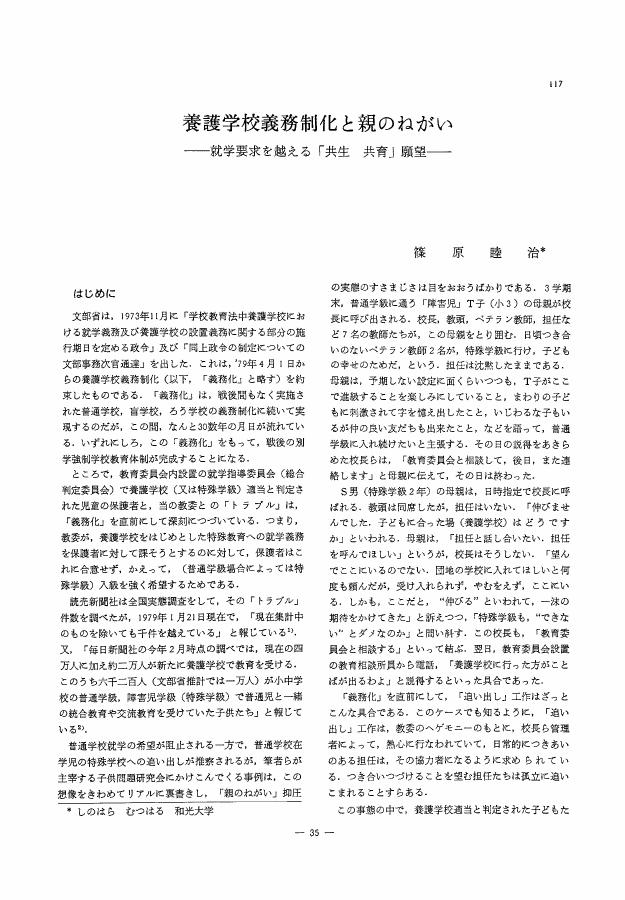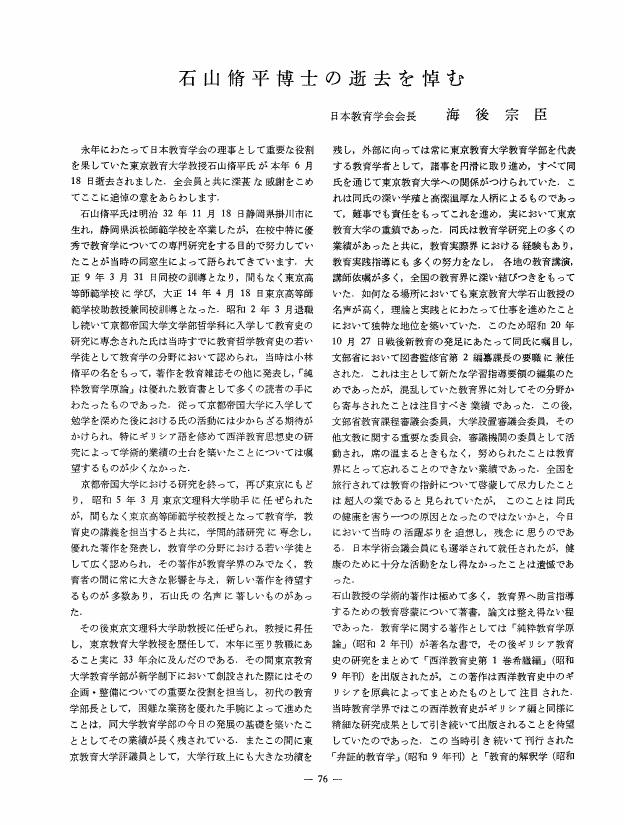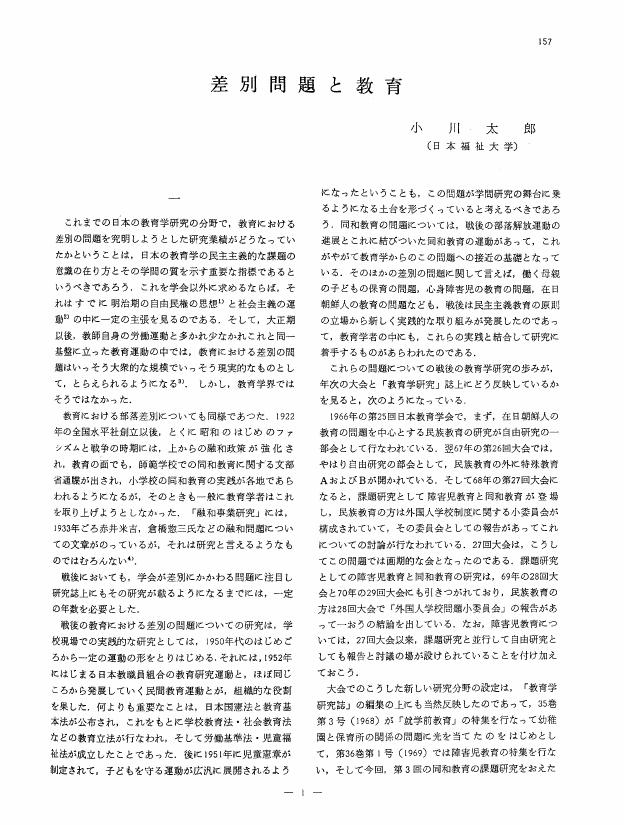- 著者
- 佐藤 貴宣
- 出版者
- 一般社団法人 日本教育学会
- 雑誌
- 教育学研究 (ISSN:03873161)
- 巻号頁・発行日
- vol.86, no.2, pp.287-299, 2019 (Released:2019-10-12)
- 参考文献数
- 26
本稿では、小学校を事例とし、個々の現場に埋め込まれて組織化される教師の実践の論理を析出することを試みる。個別の学校の日常において、障害児を含め多様な子どもたちと日々関係を営為している教師たちは、自らの教育実践をどのような仕方で意味づけ産出しているのか。本稿が経験的データの分析を通じて探求しようとするのはこの点である。そこから、包摂を志向する実践それ自体が通常学級から障害児を切り離すことへと反転しうる可能性について論考する。
- 著者
- 長谷川 裕
- 出版者
- 一般社団法人 日本教育学会
- 雑誌
- 教育学研究 (ISSN:03873161)
- 巻号頁・発行日
- vol.87, no.3, pp.405-407, 2020
- 著者
- 横井 敏郎
- 出版者
- 一般社団法人 日本教育学会
- 雑誌
- 教育学研究 (ISSN:03873161)
- 巻号頁・発行日
- vol.71, no.2, pp.202-213, 2004
Decentralization reform has not been accomplished sufficiently enough, but some local governments are beginning to implement active educational administration. Now we can see two issues coming to the front - the relation between governor's department and board of education, and the relation between prefectural board of education and municipal board of education -. Concerning the first issue, namely "popular control", there is a friction of opinions. The purpose of this paper is to study what educational policies have been formed and implemented under what system and process, especially how two relations mentioned above have been organized and structurally changed. The object of this paper is Gifu prefecture that has had a governor who is a member of reformative governors and that has reformed the local educational system and started some new and original local measures which have not been enforced by national government. According to the analysis of this paper, Gifu prefecture are changing the administrative direction from control over municipalities to support of them, holding up "children-centered policy" and "participatory administration". But in the structure of educational administration. a new system has been made on which the govemor is able to influence the board of education more strongly. For example, deliberative organizations composed of the governor, the chairperson of prefectural assembly and the chief of board of education, and the similar organizations by which mayors can influence municipal boards of education have been established. This system is called "democratic control" of educational administration in Gifu prefecture. It is different from "popular control" that is one of the fundamental principles of educational administration in post-war Japan. It means the control over board of education by a governor. In Gifu prefecture, top-down type education reform has been led by the governor, pupils and students have been regarded as customers and autonomy of schools and municipal boards of education have not been given serious consideration enough. "Democratic control" has a contradiction of stripping of more contents from a board of education conversely. The number of education reforms which are led by govemors and mayors are increasing. To study on the contradiction and future of "popular control" in contemporary educational administration is the theoretical and practical challenge of educational administration.
1 0 0 0 日本における翻訳実践の淵源をめぐる系譜学的考察
- 著者
- 松下 晴彦
- 出版者
- 一般社団法人 日本教育学会
- 雑誌
- 教育学研究 (ISSN:03873161)
- 巻号頁・発行日
- vol.86, no.2, pp.176-187, 2019
<p> 本稿では、まず翻訳概念の系譜学的、超越論的な観点から、現代文に特徴的な漢字仮名交じり文の淵源について、漢字仮名交用の創成過程、漢字訓読法とその批判としての国学の意義に論及し、次に翻訳がナショナリズムおよび国民語の創成の要件であることについて諸外国の事例とともに考察する。最後に、西田哲学の「無の場所」と時枝文法の「辞」の意義を確認し、日本の翻訳実践としての表記法と外来思想に対する日本的思想的態度との相関について考察する。</p>
1 0 0 0 大西伍一の思想と実践
- 著者
- 小林 千枝子
- 出版者
- 一般社団法人 日本教育学会
- 雑誌
- 教育学研究 (ISSN:03873161)
- 巻号頁・発行日
- vol.50, no.4, pp.363-372, 1983
- 著者
- 中野 実
- 出版者
- 一般社団法人 日本教育学会
- 雑誌
- 教育学研究 (ISSN:03873161)
- 巻号頁・発行日
- vol.66, no.2, pp.193-200, 1999
1886(明治19)年に創設された帝国大学は、日本の近代大学史において一つの大きな画期であり、大学制度の原型を示した。この帝国大学創設期の大学政策及びそれに深く関わった初代文部大臣森有礼の分析は、大学制度の原型形成期研究としてきわめて重要である。本試論は、帝国大学令そのものの成立過程にいまだ多くの不明な点を残している現在の研究状況にあって、東京大学所蔵の学内文書を取り上げ、これまで考察の対象とされることがほとんどなかった諸史料を提供することを第1の課題としている。創設期とは便宜的区分であり、森の文部大臣就任期間中を指す。さらに、この時期、すなわち「帝国大学体制」形成の最初期における帝国大学の学内規則の制定、改正過程を大学と文部大臣森有礼との応答関係を中心に分析する。具体的には、1)下級学校と帝国大学のアーティキュレーションに関する入学資格問題、2)学位制度改革に関わる学士号設定問題、3)創設直後の大学院制度に関わる問題を取り上げる。これらを通して、第2の課題として本試論は森文政期の大学像を再検討する。分析の結果については、以下の通りである。第1の史料の掘り起こしと評価について。学士称号授与の「説明」と大学院規程の改正説明とは、これまでまったくほとんど知られでいなかった史料である,。この史料の存在により、2つの事柄が帝大からの発議によって成立したことが明確になった。帝国大学の大学としての主体形成が、創設直後から開始されていったといえるだろう。さらに新らしい史料の提示は、帝国大学以外の機関においても史料所蔵の可能性があることを示唆するとともに、森文政期を検証する重要な方法になると思われる。第2は帝国大学理念にかかわる事項である。上記の2つの史料は、いわば大学の「現場」からの帝国大学理念の変更があったことを物語っている。大学院規程の改正説明は、大学院組織の有名無実化を公言して、分科大学本体論を展開していた。これは大学院と分科大学を以て構成するとした帝国大学理念の実質的な変更である。帝国大学は一方で文部大臣の影響力、応答を強く意識しながら、他方で成立一年後あたりから実態に沿った改革を行い始めた。この背景には、帝国大学が創設直後から着実に学士養成の役割を果し、学術研究機関としての実質を備えはじめていたことがあった、と思われる。それらに対して森は現実、実態による理念の変更については認めざるを得ない状況にあった、と言える。
1 0 0 0 OA 養護学校義務制化と親のねがい-就学要求を越える「共生共育」願望
- 著者
- 篠原 睦治
- 出版者
- 一般社団法人 日本教育学会
- 雑誌
- 教育学研究 (ISSN:03873161)
- 巻号頁・発行日
- vol.46, no.2, pp.117-125, 1979-06-30 (Released:2009-01-13)
- 参考文献数
- 35
- 被引用文献数
- 1
1 0 0 0 OA 石山脩平博士の逝去を悼む
- 著者
- 海後 宗臣
- 出版者
- 一般社団法人 日本教育学会
- 雑誌
- 教育学研究 (ISSN:03873161)
- 巻号頁・発行日
- vol.27, no.3, pp.240-241, 1960-09-30 (Released:2009-01-13)
1 0 0 0 OA 近代学校における身分的差別
- 著者
- 安川 寿之輔
- 出版者
- 一般社団法人 日本教育学会
- 雑誌
- 教育学研究 (ISSN:03873161)
- 巻号頁・発行日
- vol.38, no.3, pp.175-186, 1971-09-30 (Released:2009-01-13)
- 参考文献数
- 58
1 0 0 0 OA 大淀昇一著『宮本武之輔と科学技術行政』
- 著者
- 細井 克彦
- 出版者
- 一般社団法人 日本教育学会
- 雑誌
- 教育学研究 (ISSN:03873161)
- 巻号頁・発行日
- vol.57, no.3, pp.298-299, 1990-09-30 (Released:2009-01-13)
- 著者
- 舘 かおる
- 出版者
- 日本教育学会
- 雑誌
- 教育学研究 (ISSN:03873161)
- 巻号頁・発行日
- vol.66, no.4, pp.406-416, 1999-12
本論では、日本の大学における教養教育の分野でなし得ている、女性学・ジェンダー研究の貢献について検討する。 従来の定義に従えば、教養教育の役割は、人文学と自然科学の幅広く基礎的な「知」の習得を通じて、学生たちを良く均整のとれた人間に成長させるように促すことであるが、第二次女性解放運動後、その「知」は、ジェンダー化(性別に関わる偏向がある状態)されていると認識されるようになった。ジェンダーは、我々の社会組織や自分自身の経験の最も基本的な構成物の一つである。また、ジェンダー関係を理解することは、地域的にも世界的にも、社会変化の過程と現代の社会生活を理解するための中心と言える。それ故、大学の教養教育にジェンダーの視点を組み入れることは、重要なことである。他の国々と比較すると、日本ではそんなに多くの大学ではないが、女性学・ジェンダー研究を提供している。国立婦人教育会館が行った調査によれば、1996年で351の大学が、女性学・ジェンダー論の講座を開設しているが、学部レベルで女性学・ジェンダー研究の学位を取得できる大学は皆無であり、大学院レベルでは城西国際大学とお茶の水女子大学で修士と博士の学位を習得できるのみである。 本論では、一章で、日本の大学において見られるジェンダー・バイアスの様々な局面について、大学の女性教員数が少ないことを含め、論じている。二章では、日本の大学における女性学・ジェンダー論講座の概況について述べている。三章では、女性学・ジェンダー論講座を登録する学生が増えているいくつかの理由について考察している。その理由の一つには、この講座を教える者たちが用いる革新的な教育方法にある。四章では、女性学・ジェンダー研究が提供する「新しい知」に直面した学生の反応をいくつか記述している。 日本の教育システムは、一般に学生たちの経験から分離した様々な知を暗記して吸収するよう教えられることが普通である。しかし、本論で示すように、学生たちは、女性学・ジェンダー論を履修して、知がどのように構築されているかを知るようになり、同時に、既存のシステムを疑い、挑戦し、新しい知を構築する力を得ることを実感する。さらに、ジェンダー・アイデンティティが社会的文化的に構築されるという気付きは、社会的な慣習や規範に縛られることなく、自分のアイデンティティを構築し、新たな未来を発見する可能性を開くようになる。また、女性学・ジェンダー論は、公的領域でのジェンダー化された権力関係を見ることも可能にする。例えば学生たちは、少年のグループによって,女子高校生が連れ去られ、強姦され、殺された時の、メディアの報道における隠されたジェンダー・バイアスを見つける。日本の法システムにおいて、強姦犯に課する罰の軽さと同様に、強姦の被害者に対する警察の扱いが軽いことに、男子学生、女子学生に限らず、学生たちは警告を発するようになることにも触れている。一端、社会システムも知もジェンダー化されていることを認識すると、例えば、フランス革命における人権宣言や共和制の理念が、女性を排除したことの意味を、学生たちはたやすく理解する。さらに、近代科学が女性と人種に対し差別化したことも知り得る。このような気付きは、ジェンダー・バイアスのない新しい知を創ることが重要と考えるように彼らを力づける。 多くの国で、様々な分野におけるジャンダー分析が、有益であり重要であると認識されている。それ故、21世紀においては、すべての大学の教養教育に、女性学・ジェンダー研究の視点が含まれるべきであると思われる。\\r\\\\\r\\\In this paper, I will examine the contribution of women's studies/gender studies in the area of "kyoyo kyoiku" (Liberal/General Education) in Japanese universities. According to the traditional definition, the role of "kyoyo kyoiku" is to assist the development of well-balanced personality among university students through the acquisition of broad-based knowledge in Arts and Sciences. But after the second wave of women's movement, it is generally accepted that "knowledge" is genderized. Gender is one of the most fundamental structures of our social organization and our experiences of ourselves. An understanding of gender relations is therefore central to an understanding of contemporary social life and processes of social change, locally and globally. It is therefore important to include gender perspectives in "kyoyo kyoiku" at the universities. Com-pared to other countries, however, not many Japanese universities offer women's/gender studies. According to the survey done by the National Women's Education Center in 1996, 351 universities have such courses but none offers a degree course at the undergraduate level. And at the graduate level, Josai International University and Ochanomizu University offer M.A. and Ph.D.degrees. Section One discusses various aspects of gender bias found in Japanese universities, including the under-representation of female faculty members. Section Two introduces a general survey of women's/gender studies courses offered in various Japanese universities. Section Three considers several reasons for the increase in the number of students enrolling in women's/gender studies courses. One reason is the innovative method of teaching employed by those who teach the courses. Section Four describes some of the students' reactions, when they are confronted with "new knowledge" offered by women's/gender studies. In the Japanese education system, students are normally instructed to memorise and absorb "knowledge" which is remote from their own experiences. But this paper shows that when students are exposed to women's/gender studies, they come to see how "knowledge" is constructed, and realize that they have the power to challenge /question the old value system and construct a new one. Furthermore, the awareness of how gender identities are socially/culturally constructed opens the possibility of constructing their own identity without being bound by social convention and thus of discovering a new future. Women's/gender studies also enable them to see the gendered power relationship in public arena. For example, upon examining an incident when a high school girl was kidnapped, raped and murdered by a group of youths, most students taking these courses were able to see the hidden gender bias in mass media.
1 0 0 0 OA 園田英弘,濱名篤,廣田照幸著「士族の歴史社会学的研究」武士の近代
- 著者
- 辻本 雅史
- 出版者
- 一般社団法人 日本教育学会
- 雑誌
- 教育学研究 (ISSN:03873161)
- 巻号頁・発行日
- vol.62, no.2, pp.135-137, 1995-06-30 (Released:2009-01-13)
1 0 0 0 OA 差別問題と教育
- 著者
- 小川 太郎
- 出版者
- 一般社団法人 日本教育学会
- 雑誌
- 教育学研究 (ISSN:03873161)
- 巻号頁・発行日
- vol.38, no.3, pp.157-163, 1971-09-30 (Released:2009-01-13)
- 参考文献数
- 14
1 0 0 0 OA 少子化の中の教員養成と教育学 教員養成系大学・学部の挑戦
- 著者
- 毛利 猛
- 出版者
- 一般社団法人 日本教育学会
- 雑誌
- 教育学研究 (ISSN:03873161)
- 巻号頁・発行日
- vol.87, no.2, pp.203-213, 2020 (Released:2020-09-30)
少子化の進行に伴って新しい「大学の大衆化」の段階に突入し、教員養成の自然な基盤が掘り崩されている中で、教職が労働市場で急速に魅力を失いつつある。教員の「量の確保」の問題は「質の担保」の問題と必ず連動する。これらの教員養成をめぐる危機について考察した上で、実践力養成への期待の高まりと失望、それへの「大学における教員養成」と「教育学」教育の側からの対応について、この間の教員養成政策とも絡めながら論じた。
1 0 0 0 OA 今田 絵里香 著『「少年」「少女」の誕生』
- 著者
- 和崎 光太郎
- 出版者
- 一般社団法人 日本教育学会
- 雑誌
- 教育学研究 (ISSN:03873161)
- 巻号頁・発行日
- vol.87, no.2, pp.264-265, 2020 (Released:2020-09-30)
1 0 0 0 OA 上田 誠二 著『「混血児」の戦後史』
- 著者
- 児島 明
- 出版者
- 一般社団法人 日本教育学会
- 雑誌
- 教育学研究 (ISSN:03873161)
- 巻号頁・発行日
- vol.87, no.2, pp.260-261, 2020 (Released:2020-09-30)
- 著者
- 佐藤 秀夫
- 出版者
- 一般社団法人 日本教育学会
- 雑誌
- 教育学研究 (ISSN:03873161)
- 巻号頁・発行日
- vol.68, no.4, pp.386-396, 2001-12-30 (Released:2007-12-27)
1 0 0 0 OA 男女平等教育と日本の教育学研究
- 著者
- 安川 寿之輔
- 出版者
- 一般社団法人 日本教育学会
- 雑誌
- 教育学研究 (ISSN:03873161)
- 巻号頁・発行日
- vol.49, no.3, pp.244-254, 1982-09-30 (Released:2009-01-13)
- 参考文献数
- 52
1 0 0 0 OA 社会科におけるグローバル教育の4つのアプローチ
- 著者
- 大津 和子
- 出版者
- 一般社団法人 日本教育学会
- 雑誌
- 教育学研究 (ISSN:03873161)
- 巻号頁・発行日
- vol.61, no.3, pp.279-286, 1994-09-30 (Released:2009-01-13)
- 参考文献数
- 27
1 0 0 0 OA 人格の完成をめざす教育の意味
- 著者
- 中村 清
- 出版者
- 一般社団法人 日本教育学会
- 雑誌
- 教育学研究 (ISSN:03873161)
- 巻号頁・発行日
- vol.65, no.4, pp.299-307,418, 1998-12-30 (Released:2007-12-27)
The Fundamental Law of Education specifies that education shall aim at the full development of personality. This aim has been generally accepted by most of those engaged in educational theories and practices as well as in policy making. But interpretation of the aim has been so ambiguous that quite opposite views on education have been justified. Particularly problematic is that the original intent of the aim, i.e.education should aim at the full development of personality because it is broader and more basic than the formation of a good member of the nation, seems to be forgotten by most interpretations. This paper tries to clarify the weakness of the usual interpretation of the aim and to replace it with a more reasonable one. The concept of the personality in the original interpretation of the aim presupposes that human beings are unique in that they have the ability of reson. This characteristic enables them to pursue the universal values of truth, good and beauty, free from the causality of the material world. This interpretation has been accepted by most educational literature and policy documents. The concept of reason in the interpretation is almost the same as that in the age of the Enlightenment. Such a view has been persuasively critcized since the 19th century, particularly by so-called postmodern thinkers of the present. The above interpretation of the full development of the personality neglects these criticisms and, as a result, becomes an abstract concept which fails to have concrete effect on educational practices. A dificulty in educaionsl theories based on the Enlightenment concept of the reason is that a clear distinction is made between adults and children, namely, rational adults educate irrational children until they become rational. Viewed in this way, children's ability to reason has no place in education and neither equal relationaship nor mutual understanding between adults and children can be established. Then education becomes just another name for conditioning children by adults. This is a logical consequence of the Enlightenment theory of education that justifies the transformation of public education into national education. Although human beings may bear different values in different societies and among individuals in the same society as well, they may find common values if they make an adequate effort to do so when necessary. At least this possibility should not be denied even before they try. The ability to find a common value when necessary may be called reason, because it is what makes human beings understand each other in an equal relationship. Education that aims at the full development of personality based on this understanding of reason means to enhance mutual understanding of human beings. This effort is mainly made by adults upon children within a certain society, but in principle it is open to all human beings.








